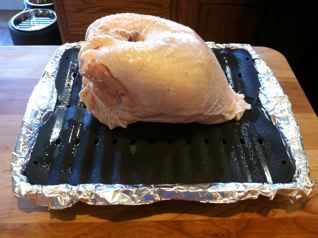 Food Safety App
Food Safety App
Holiday time is a busy time for everyone.
It is easy to get so caught up in the hustle and bustle of the season that one can lose track of time and/or could easily forget some critical aspects of proper food handling.
Staying on top of food safety awareness can mean the difference between a Happy Holiday or running the risk of needless food poisoning that could have been avoided.
(Photo of fresh, whole, skin-on, bone-in, unbrined, plain, raw 6.63 pound turkey breast ready for oven roasting shown prior to adding any herbs and/or spices, basting, etc. ©2012 courtesy of GH in conjunction with Sensory Nutrition.com)
The Academy of Nutrition and Dietetics in collaboration with Con Agra Foods earlier this year launched a food safety app via the Home Food Safety program named “Is My Food Safe?”
The app has details such as proper temperatures for cooking food items, as well as details such as shelf life of leftovers and additional food items, a kitchen food safety quiz, etc.
To see what can go wrong with food when leftovers get forgotten or food is past its use expiration date, you can also check out an online interactive quiz “What Was It?”
CeliacNow Site Launched
Beth Israel Deaconess Medical Center in Boston, MA launched a new site, www.CeliacNow.org, this past November 14, 2012.
Registered Dietitian (RD), Melinda Dennis, MS, RD, LDN noted in an email announcing it to fellow RDs that the primary mission of the site is to “help those who do not have access to celiac centers or experienced clinicians. It is written by celiac experts in nutrition and edited by celiac gastroenterologists and expert celiac dietitians.”
The site offers an email signup option if anyone is interested in “article updates, research opportunities, and new resources” noted Melinda.
As of the date of this blog post, the main content populated thus far deals with nutritional management of celiac disease, however, Melinda anticipates that a section with medical content will be forthcoming in early 2013.
FODMAPs Update
Management of Irritable Bowel Syndrome (IBS) or Irritable Bowel Disease (IBD), as well as other Gastrointestinal (GI) Disorders can be very frustrating for both consumers and their health care providers alike. So much of our body’s immune system is inextricably linked to the proper functioning of our GI tract that gut health is of paramount importance for all of us.
At the cutting edge of research into this arena is the Eastern Health Clinical School (EHCS), Monash University, Australia, which has been looking into the dietary approach of focusing on the role of FODMAPs for quite some time now.
FODMAP stands for: Fermentable Oligosaccharides, Disaccharides, Monosaccharides And Polyols.
A FODMAPs dietary approach protocol might be initiated if it is suspected that any of certain specific forms of carbohydrates (lactose, fructose, fructans, sugar alcohols, and galactans) might be implicated in what are often considered IBS related symptoms.
If after eliminating the sources of those carbohydrates (thus the FODMAP elimination dietary approach) for 1 – 2 weeks symptoms resolve, then one-by-one the carbohydrates are added back into the dietary intake as challenge foods and follow- up symptoms are then tracked.
Only those carbohydrate sources that are well tolerated will then be included on the long term dietary maintenance plan.
The focus at the EHCS is on bowel physiology, Crohn’s disease, chronic gastrointestinal diseases, dietary intake, gastroenterology, and IBD research.
In September 2012, EHCS released the latest hard copy 3rd edition (as of the date of this blog post) of The Low FODMAP Diet which can be ordered online (phone inquiries contact: Brianna McFarlane 03 9903 0526).
Note that Monash University has advised that the Monash University Low FODMAP Diet app for iPhone is coming soon. See Monash Magazine for details.
Other previously available resources from Monash University can also be ordered using a downloadable order form.
Sue Shepherd, PhD pioneered the FODMAPs dietary approach and is affiliated with Monash University where she completed her doctoral work. Dr. Shepherd has published a number of cookbooks and runs a bustling nutrition practice called Shepherd Works in Australia employing a staff of dietitians there.
In the USA, related to FODMAP principles, Kate Scarlata, RD has a FODMAPs Diet Grocery List description (also available as a downloadable pdf) and recently (October 2012) updated her FODMAPs Diet Checklist description (also available as a downloadable pdf). Kate is the author of the book: The Complete Idiot’s Guide to Eating Well with IBS (Jul 6, 2010).
As Kate always says, be sure to re-check ingredient labels, since manufacturers indeed keep changing what they are putting into various products they sell.
Patsy Catsos, MS, RD also covers the subject of FODMAPs at her site http://www.ibsfree.net/. She also has a book: IBS-Free at Last! Change Your Carbs, Change Your Life with the FODMAP Elimination Diet (2nd edition) (Apr 11, 2012)
On Patsy’s website are details concerning FODMAP content when it comes to herbs and spices which might be of interest to consumers during the holidays and more.
Other dietitians are also putting up blog posts on the subject of FODMAPs as more clinicians become aware of the approach.
Of course, as always, we urge you to contact your own health care provider(s) when it comes to issues of your own personal health or the health care management of any of your family members.

